Learning from the climate laggards – Green Business Forum aims to take sustainability beyond the classroom
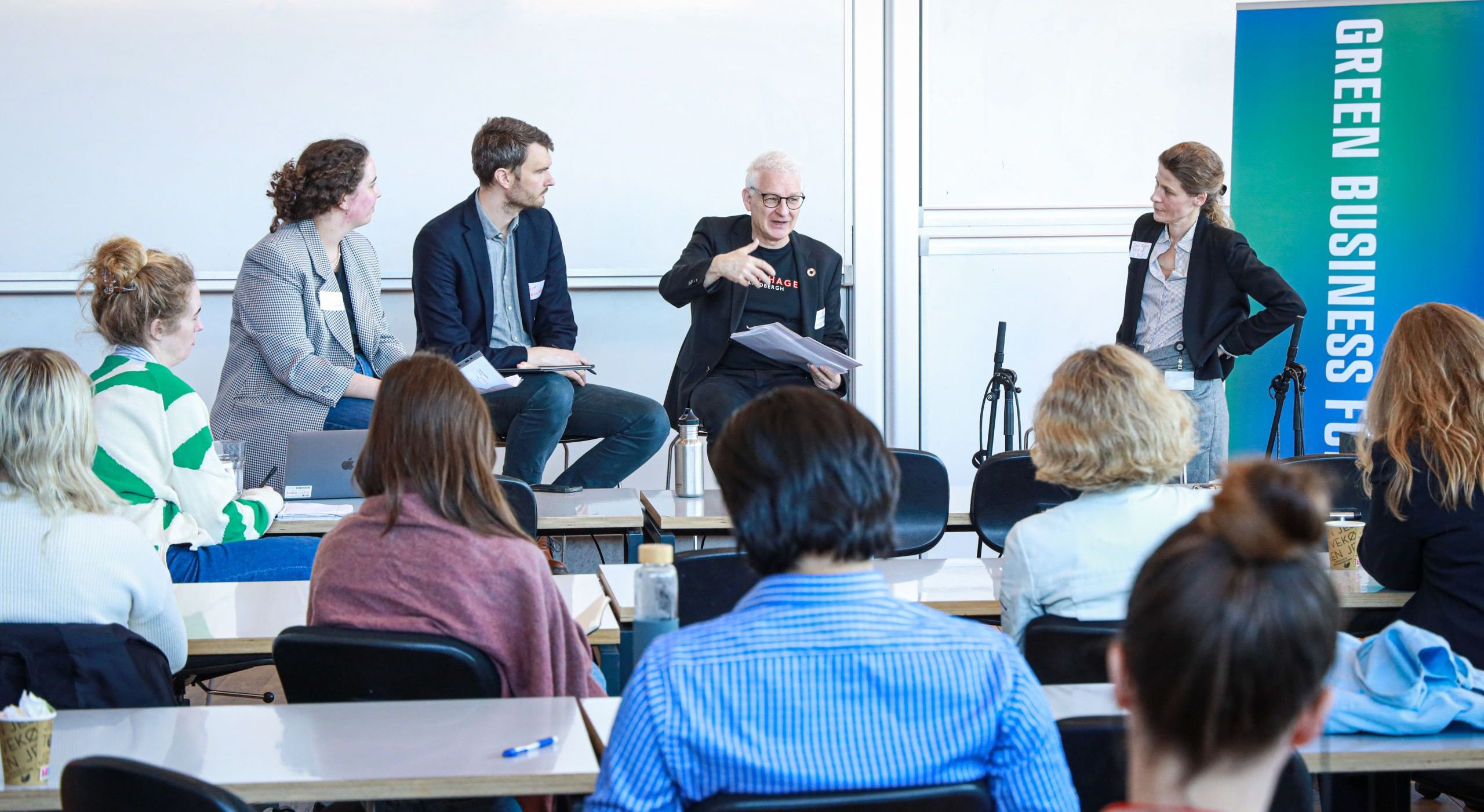
The Green Business Forum took place in Kilen 18 to 19 April. Vera Simoneit, PhD Fellow and Jacob Hasselbalch, Associate Professor ask questions to Henrik Jørgen Andersen, Executive R&D Advisor, Arla. Right, Jane Bjørn Vedel, Associate Professor. Photo: Anna Holte.
Sustainability is “a bit like teenage sex. We all like to say we’re doing it, but few people actually are and those who are do it poorly”. At least according to Morten Westergaard, head of climate and energy from Middelfart Municipality and panellist at the Green Business Forum at CBS. But talking can also be the start of something. For the first Green Business Forum held at CBS, students, faculty and business professionals teamed up to share ideas and address pressing questions that can push the green transition.
Hanne Harmsen, Vice Dean of Green Transition at CBS and one of the conference organisers, thinks the most important actors when moving from talk to action are students.
“The more interested and involved they get with sustainability during their studies, the more they will go and create impact afterwards in their jobs,” she writes to CBS WIRE after the event.
Students also accounted for the majority of participants at the Green Business Forum, a two-day event held at CBS in April. The event was co-organised between CBS and the green student organisations, building on Green Week which the student organisation Oikos has been hosting since 2012.
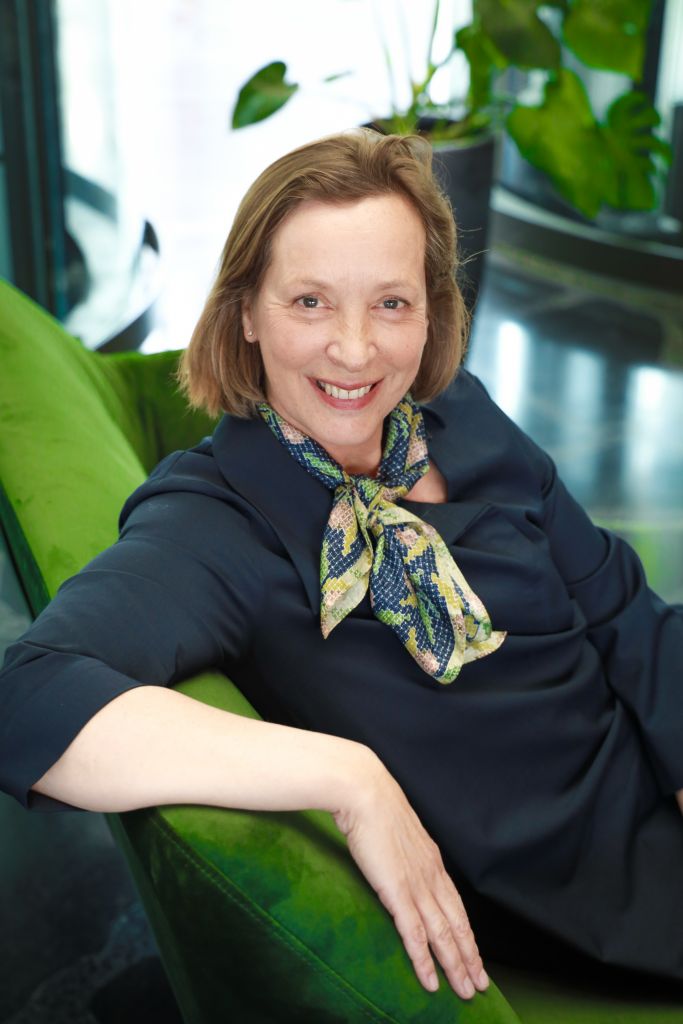
Hanne Harmsen, vice dean of green transition at CBS. Photo: Anna Holte.
The aim was to bring students, faculty and business professionals together to share knowledge and ideas. A key premise was also to showcase what CBS can bring to the green transition – a lot, according to Hanne Harmsen.
“Many people think in terms of STEM (science, technology, engineering and mathematics, ed.) and technological discoveries when they think of how to solve the climate crisis, but as a social science university, we have so much to offer. Social sciences deal with aspects such as behaviour, governance, legislation and new business systems, but we haven’t been very visible or clear in that role,” she says.
When organising an event for the first time, you can never know how many people will show up. But as the first morning sessions are about to start at Kilen, Hanne Harmsen is already enthusiastic over the turnout.
People make their way to the first sessions with coloured nametags: red for CBS staff, blue for business and green for students. The vegan lunch is ready. The velvet sofas are green.
The organisers have employed a bottom-up approach where contributors have suggested topics themselves. The result is a smorgasbord of panels, including topics such as how to teach sustainability, entrepreneurship and sustainable gardening.
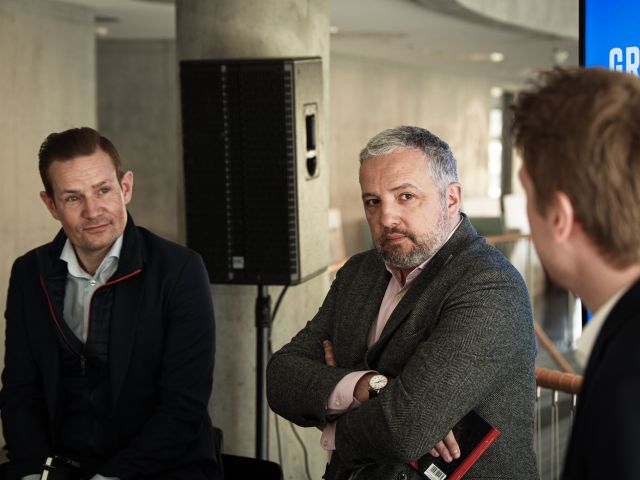
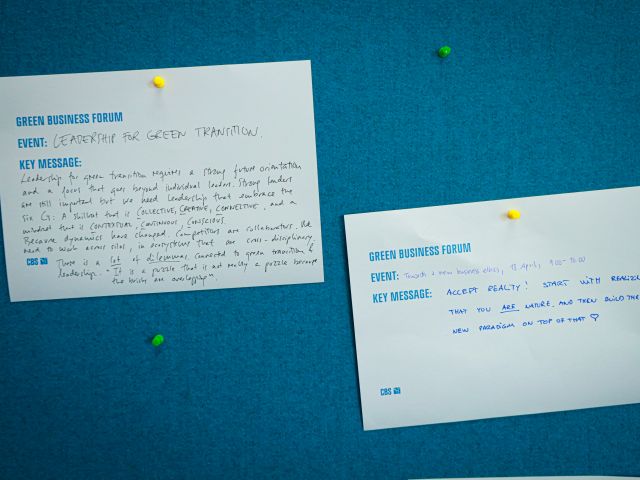
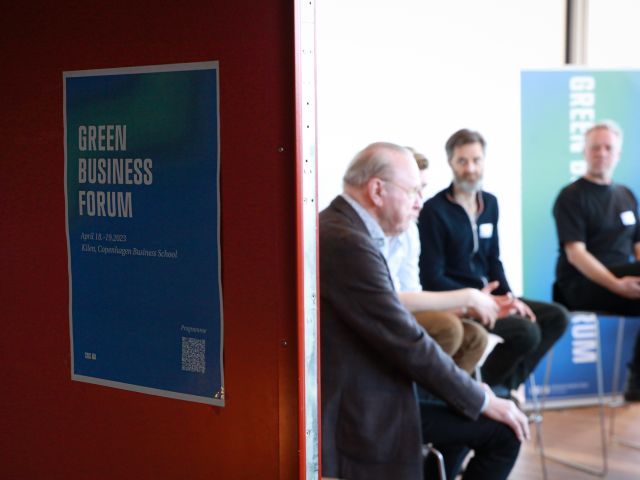
The opening panel debate, on the future of business ethics, takes us down a philosophical discussion of whether hopelessness motivates or deters us and of humans’ relation to nature.
“Humans are part of nature but there is a difference, namely that we are able to consciously impact the world and other parts of nature, which other animals aren’t. This gives us responsibility for our behaviour and decisions, as we can consciously impact all other parts of nature,” says Rasmus Johnsen, Associate Dean for Lifelong Learning at CBS.
If the social responsibility of business is only to increase profits, how can businesses be made to change? A new business ethics that respects the planetary boundaries and the Sustainable Development Goals, cooperative ownership structures, or legislation?
Claiming you’ll be net zero in 2050 doesn’t mean anything. It’s a rhetoric we wouldn’t accept in any other case.
Esben Rahbek Gjerdrum Pedersen, Professor, CBS Sustainability Centre
During a greenwashing debate Esben Rahbek Gjerdrum Pedersen, Professor, CBS Sustainability Centre, calls out how absurd it is that in relation to sustainability, simply articulating future ambitions can be considered an achievement – that’s also greenwashing, he argues.
“Claiming you’ll be net zero in 2050 doesn’t mean anything. It’s a rhetoric we wouldn’t accept in any other case: ‘Sorry, I manipulated the stock market and reported making money even though we’re bleeding.’ You would never hear that, but somehow, we’re supposed to accept it when it comes to sustainability. There’s a rhetoric in sustainability that is not used nor accepted anywhere else.”
Clearly, there is work yet to be done.
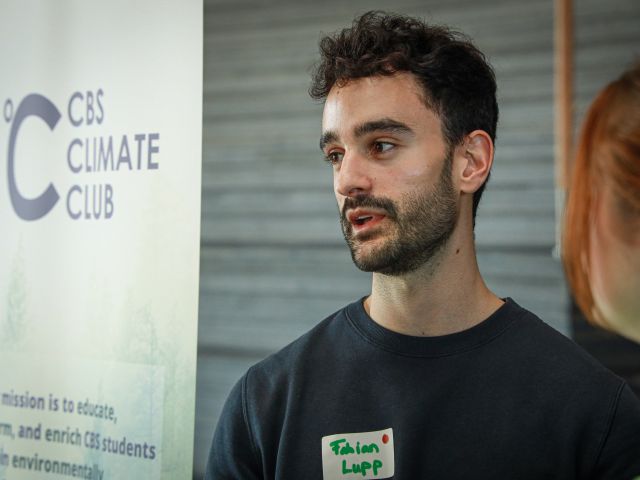
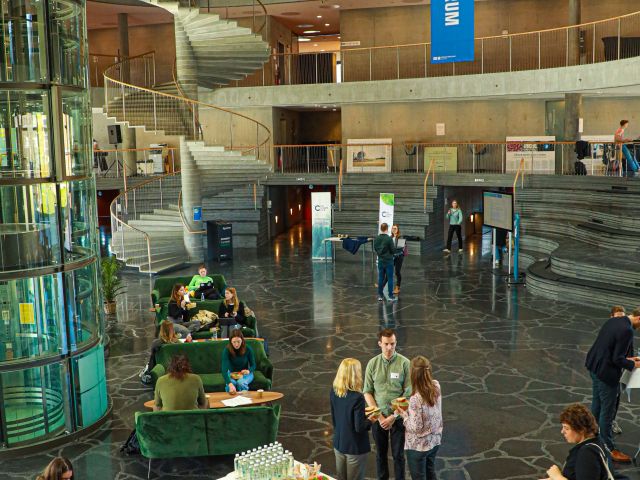
In a corner of the atrium, where some of the panels are held around boomerang-shaped tables, Jonna Sophie Schmude, student assistant, kindly tells three students that a session will be starting shortly where they are sitting. She invites them to stay, but they have to go to corporate finance class.
“I guarantee this is much better,” she probes.
When they hear that their professor is speaking, they seem almost convinced.
“If class is boring, we’ll definitely come,” one of them says as they grab their bags and leave.
Show me the money
If one is to believe Laurits Bach Sørensen and Cornel Ban it all boils down to one thing: money. And there is not enough of it going to the right places. At least not in Denmark.
Cornel Ban is associate professor of International Political Economy at CBS, and Laurits Bach Sørensen is cofounder and partner at Nordic Alpha Partners, a growth equity fund that invests in green, digital, global hard-tech companies – “anything driving forward tech that makes the world greener”.
Together, they form a pairing which, despite them mostly agreeing and adding to each other’s points, generates the energy of a heated debate.
Moderator Malte Warner, from CBS Climate Club, sets them up well:
“Is Denmark a green pioneering nation?” he asks.
“No.”
“No. From a communications and identity aspect, we are. […] I’m sceptical, given what the government is doing in terms of new technology. They were extremely good in the eighties but have lagged behind. Sleeping on one’s laurels it’s called,” Cornel Ban says.
Green success stories in Denmark worth telling beyond wind energy?
“Not yet,” think the panellists.
What Denmark has done for the wind industry – they argue in tandem – it is failing to do for the green transition.
Not enough investments are going to hard tech where development is needed in key areas such as green energy production and recycling. And too much funding is going to fast-growing tech companies with apps and software.
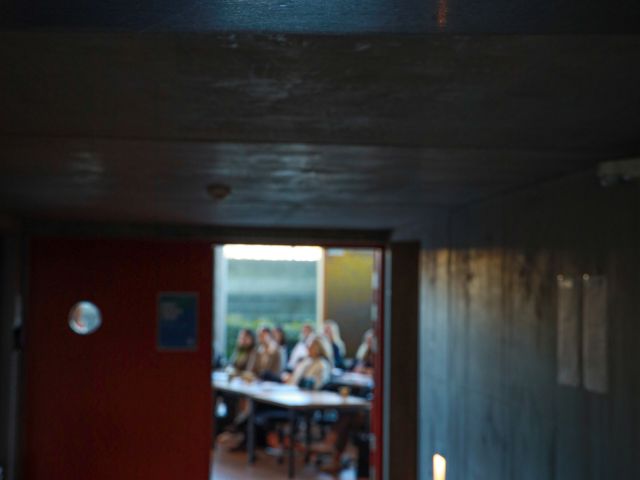
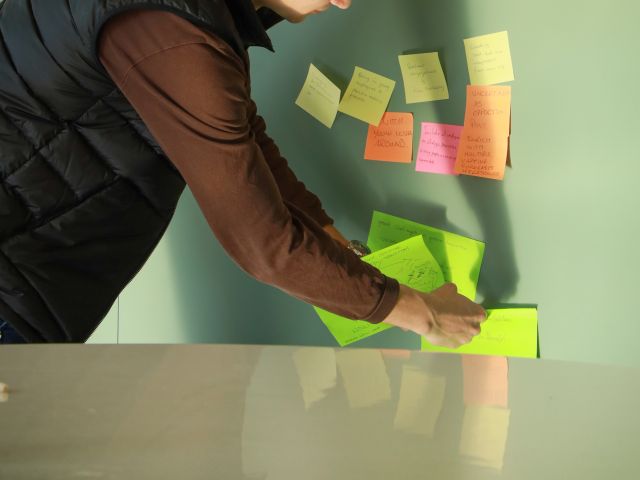
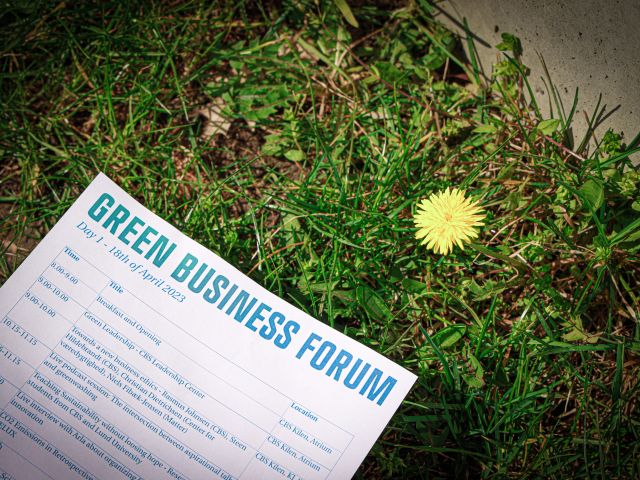
Their conversation is fast and filled with numbers. Public investors such as the European Investment Bank and the Danish Growth Fund are not allocating enough to green projects, they argue.
“We put very little money on the table for green investments. Without massive green tech investments, we’re going to lose this race,” Cornel Ban asserts.
Even a window that opens and closes repeatedly, making an infuriating noise – the noisy externalities of smart architecture – does not faze them.
So, can the solution be found among CBS students?
As Laurits Bach Sørensen puts it, when you look at senior management level of a company, only one out of five comes from the “innovation side”. The CEO, CFO, COO and CMO are all “from CBS”.
“Young people need to lead the transformation.”
Enough of frontrunners, let’s hear it from the climate laggards
Students Fabian Lupp and Camille Paolini, standing in a CBS Climate Club booth in the atrium, are ready to do just that.
As foreign students in Denmark, they think sustainability education at CBS and in Denmark upholds high standards, but it can improve.
“There are so many teachers here doing interesting research. I would love to see more of an impulse on that,” says Camille Paolini, an exchange student from Marseilles.
When she came to CBS, she felt that she knew more than many professors.
“There’s the part that wants to be more forward thinking, that wants to be more sustainable, and there’s another part that’s like: ‘no we’re keeping the old concepts, we don’t want to budge’.”
“I would say mostly the finance part, which also takes too much space. Like, circular economy, we need to talk about it straight away.”
I think it’s more practical if those companies that are not sustainable yet come here. The ones that kind of tried but didn’t succeed and that we learn from their challenges.
Fabian Lupp, master’s student in Innovation and Business Development
Fabian Lupp, a master’s student in Innovation and Business Development, thinks CBS is far ahead of the German university where he got his bachelor’s degree.
“In some courses, teachers try to integrate sustainability and it’s one small part in the last lecture. Obviously, you realise that’s just because they have to, but still, they try.
“This, I didn’t see back in Germany,” he says.
But he thinks CBS could go beyond showing only the good examples of companies pioneering sustainability.
“Of course, you get inspired by that, but at the same time, 90% of us students will end up in companies that are not sustainable. I think it’s more practical if those companies that are not sustainable yet come here. The ones that kind of tried but didn’t succeed and that we learn from their challenges, because we’ll be facing those challenges.”
He thinks a career at one of those companies at the back of the sustainability line could be satisfying.
“That’s where we would have the greatest impact in the end.”


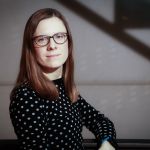
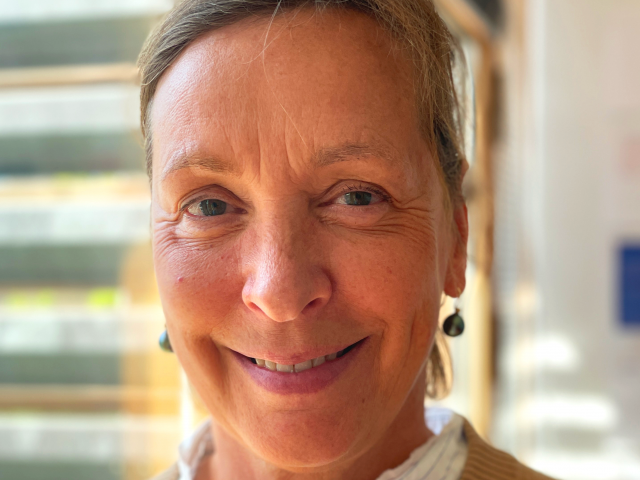

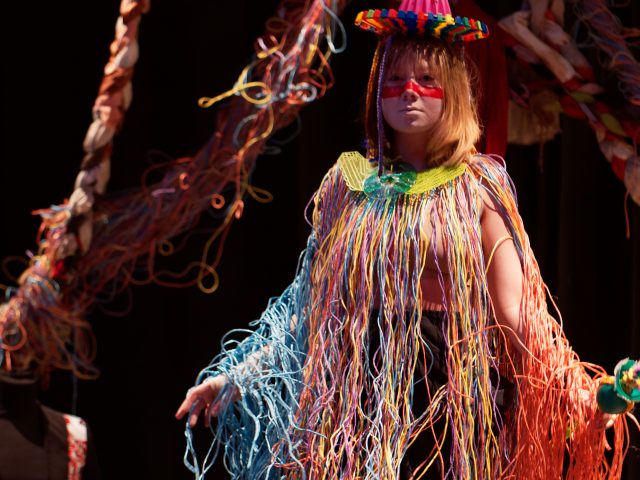






























































































































Comments